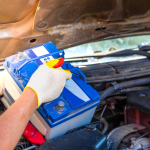Owning a vehicle is more than just having the freedom to go where you want, when you want—it’s also a commitment to keeping your car in top shape. Proper car maintenance not only ensures your safety on the road but also enhances the longevity and performance of your vehicle. Whether you’re a seasoned car enthusiast or a first-time owner, understanding the basics of car care can save you time, money, and unexpected breakdowns.
In this article, we’ll explore essential car maintenance tips that every vehicle owner should know. From routine checks to seasonal preparations, we’ll guide you through simple yet effective practices that will help you keep your car running smoothly for years to come. So, buckle up and let’s dive into the world of car maintenance!
Table of Contents
- Understanding the Importance of Regular Inspections for Your Vehicle
- Key Fluid Checks: Ensuring Optimal Performance and Longevity
- Tire Care Essentials: Maintaining Safety and Efficiency on the Road
- Battery Maintenance Tips to Keep Your Vehicle Running Smoothly
- Q&A
- The Way Forward
Understanding the Importance of Regular Inspections for Your Vehicle
Regular inspections are crucial for maintaining the health and longevity of your vehicle. They provide an opportunity to identify potential problems before they escalate into serious issues, saving you both time and money in the long run. During these inspections, a trained technician can assess various components, including the engine, brakes, tires, and fluids, ensuring that everything is operating optimally. Key benefits of routine inspections include:
- Enhanced Safety: A thorough examination helps prevent accidents caused by malfunctioning parts.
- Improved Performance: Regular checks ensure that your vehicle is running at its best, enhancing fuel efficiency and overall performance.
- Cost Savings: Early detection of minor issues can prevent costly repairs later on.
- Increased Resale Value: A well-maintained vehicle retains a higher market value.
Moreover, regular inspections can help you stay compliant with local regulations and vehicle warranty requirements. Depending on your location, certain inspections may be legally mandated, helping to ensure that all vehicles on the road meet safety and emissions standards. Here’s a quick view of typical inspection points:
| Inspection Point | Importance |
|---|---|
| Brakes | Critical for safety; worn brakes can lead to accidents. |
| Fluids | Essential for engine performance; low fluid levels can cause damage. |
| Tires | Impact handling and fuel efficiency; ensure proper tread depth. |
| Lights | Vital for visibility during night driving; burnt-out bulbs can lead to accidents. |
Key Fluid Checks: Ensuring Optimal Performance and Longevity
Regular checks of your car’s fluids are crucial to maintaining its health and performance. Engine oil is the lifeblood of your vehicle; it lubricates moving parts and keeps everything running smoothly. Make sure to check the oil level regularly and change it as recommended by your manufacturer to prevent engine wear. Coolant is equally important, as it regulates engine temperature and protects against overheating. Inspect the coolant reservoir periodically to ensure it’s filled to the proper level and look for any signs of leaks.
Don’t overlook other essential fluids like brake fluid, which is vital for safe stopping, and transmission fluid, essential for smooth gear shifting. If you notice any changes in fluid color or level, it’s important to investigate further. Regularly checking your power steering fluid and windshield washer fluid can also enhance your driving experience, ensuring that you have a smooth ride and clear visibility. Keeping these fluids at optimal levels not only prolongs the life of your vehicle but also contributes to your safety on the road.
Read More: Heading Off on a Road Trip? Use This 7-Item Car Maintenance Checklist Before You Go
Tire Care Essentials: Maintaining Safety and Efficiency on the Road
Taking care of your tires is crucial for ensuring both safety and efficiency while driving. To get started, regularly check the tire pressure at least once a month or before long trips. Under-inflated tires can lead to poor handling and increased fuel consumption. You should also inspect the tread depth to ensure adequate grip on the road. A simple test is the penny test: insert a penny into the tread with Lincoln’s head facing down. If you can see the top of his head, it’s time for new tires.
Additionally, pay attention to the tire alignment and rotation. Misalignment can cause uneven wear and affect steering, while rotating your tires every 5,000 to 8,000 miles promotes even tread wear. Keeping your tires clean is equally important; dirt and debris can affect performance and longevity. Lastly, consider a seasonal inspection by a professional, especially before winter or summer road trips, which can help you identify any hidden issues. Here’s a quick reference table for your tire car maintenance checklist:
| Car Maintenance Task | Frequency |
|---|---|
| Check tire pressure | Monthly |
| Inspect tread depth | Monthly |
| Rotate tires | Every 5,000 – 8,000 miles |
| Check alignment | Every 6 months |
| Professional inspection | Before seasonal changes |
Battery Car Maintenance Tips to Keep Your Vehicle Running Smoothly
Maintaining your vehicle’s battery is crucial for ensuring a reliable start and a smooth ride. Regularly check the battery terminals for corrosion, which can hinder performance. If you notice any buildup, gently clean the terminals with a mixture of baking soda and water, using a wire brush. Additionally, ensure that the battery is securely mounted to prevent vibrations that could lead to damage. It’s a good practice to inspect the battery for any signs of wear, such as swelling or leaks, which may indicate the need for replacement.
Temperature can also impact battery life, so if you live in an area with extreme weather, consider investing in a battery blanket or insulation to protect it from the cold. When not in use for extended periods, disconnect the battery or use a trickle charger to maintain its charge. Regular inspections can help you identify potential issues early. Here’s a quick reference table to help you with signs that your battery needs attention:
| Sign | Action |
|---|---|
| Difficulty starting the engine | Test battery voltage and replace if low |
| Corroded terminals | Clean terminals and check connections |
| Swelling or leaks | Replace the battery immediately |
Q&A
Q&A:
Q1: Why is regular car maintenance important?
A1: Regular car maintenance is crucial for ensuring the safety, reliability, and longevity of your vehicle. It helps prevent unexpected breakdowns, reduces repair costs, and can even improve fuel efficiency. By taking care of your car, you not only protect your investment but also contribute to a cleaner environment through reduced emissions.
Q2: What are the basic car maintenance tasks every car owner should perform?
A2: Basic car maintenance tasks include checking and changing the engine oil, ensuring tire pressure and tread depth are adequate, replacing air filters, checking fluid levels (like coolant and brake fluid), and inspecting brake pads. Additionally, you should regularly clean your car, inside and out, to protect the paint and interior materials.
Q3: How often should I change my oil?
A3: The frequency of oil changes depends on your vehicle and driving habits. Generally, it’s recommended to change your oil every 3,000 to 7,500 miles, or as advised in your owner’s manual. If you frequently drive in stop-and-go traffic or on rough roads, consider changing it more often.
Q4: What should I do if my check engine light comes on?
A4: If your check engine light illuminates, don’t ignore it! This light can indicate a range of issues, from minor to serious. It’s best to have your vehicle checked by a qualified mechanic as soon as possible. They can run diagnostics to pinpoint the problem and recommend necessary repairs.
Q5: How can I check my tire health?
A5: To check your tire health, start by examining the tire tread. Use the penny test: insert a penny into the tread with Lincoln’s head upside down. If you can see all of Lincoln’s head, it’s time to replace your tires. Additionally, ensure your tires are properly inflated, as incorrect tire pressure can affect handling and fuel economy.
Q6: Is it necessary to follow the car maintenance schedule in my owner’s manual?
A6: Yes, it’s highly advisable to follow the car maintenance schedule outlined in your owner’s manual. Manufacturers provide specific guidance based on the vehicle’s design and components, ensuring optimal performance. Adhering to this schedule can also help maintain your vehicle’s warranty.
Q7: What are some signs that my brakes may need to be checked?
A7: Signs that your brakes may need attention include squeaking or grinding noises, a soft or spongy brake pedal, vibrations when braking, or a dashboard warning light. If you notice any of these indicators, it’s best to have your brakes inspected immediately for safety.
Q8: How important is it to keep my car clean?
A8: Keeping your car clean is very important! Regularly washing your vehicle helps protect the paint from dirt, grime, and road salt, which can lead to rust. Additionally, cleaning the interior contributes to a healthier environment, reducing allergens and making your drives more enjoyable.
Q9: Can I perform car maintenance myself, or should I always go to a mechanic?
A9: Many basic car maintenance tasks, like checking fluid levels, changing oil, and replacing air filters, can be done by car owners. However, for more complex issues or if you’re unsure, visiting a qualified mechanic is advisable. Learning to perform simple tasks can save you money and give you a better understanding of your vehicle.
Q10: What are the benefits of seasonal car maintenance checks?
A10: Seasonal car maintenance checks allow you to prepare your vehicle for the changing weather conditions. For instance, checking your coolant levels and battery health before winter can prevent breakdowns in cold weather. Similarly, checking your air conditioning system before summer ensures you stay comfortable during hot months. Regular seasonal checks help you identify potential issues before they become significant problems.
By taking the time to perform these essential car maintenance tasks and staying informed, every vehicle owner can enjoy a safer and more reliable driving experience. Happy driving!
The Way Forward
maintaining your vehicle doesn’t have to be a daunting task. By following these essential car maintenance tips, you can keep your car running smoothly and extend its lifespan while ensuring your safety on the road. Regular checks of fluid levels, tire pressure, and brake functionality can save you time and money in the long run, not to mention the peace of mind that comes with knowing your vehicle is in good condition.
Remember, a little preventive care goes a long way. Whether you tackle these tasks yourself or enlist the help of a trusted mechanic, staying proactive with your car’s maintenance will pay off in the end. So, take a moment to create a routine that works for you and always keep an eye on your vehicle’s performance. Happy driving, and here’s to many more safe and enjoyable journeys ahead!











